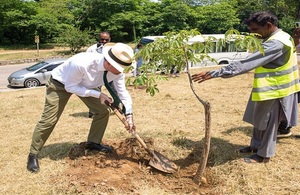The National Drought Group, made up of senior decision makers from the Environment Agency, government, water companies and key representative groups, joined by Water Minister Steve Double, met today (Friday 12 August) to discuss the response to the driest summer in fifty years and the continued action needed. The group discussed the current outlook and the associated risks and impacts and agreed to further collaborative work across sectors to balance water needs and conserve water.
At the meeting , the Environment Agency said that the drought trigger threshold had been met to move parts of the South West, parts of Southern and Central England, and the East of England into Drought.
The Environment Agency confirmed Drought status in eight of its 14 areas:
- Devon and Cornwall
- Solent and South Downs
- Kent and South London
- Herts and North London
- East Anglia
- Thames
- Lincolnshire and Northamptonshire
- East Midlands
On Tuesday 16 August, the Environment Agency subsequently confirmed that Yorkshire had also moved into Drought status.
The triggers used to confirm the move to Drought status for these areas include the hydrological position (including rainfall, river flows, groundwater levels, reservoir levels, and the dryness of soils), as well as the impacts these conditions have on public water supply, abstractors (including farmers) and the environment. This is determined by the Environment Agency at a local level, rather than nationally.
This change in status to drought is a change in categorisation, indicating the impact prolonged dry weather is having on water resources and the environment. It does not automatically trigger actions itself, but moving to drought status means that the Environment Agency and water companies will step up their actions to manage the impacts and press ahead with implementing the stages of their pre-agreed drought plans. These plans follow local factors including reservoir levels, demand and forecasts, and lead to precautionary actions such as Temporary Use Bans. The last drought in England was 2018.
Essential supplies of water are safe. Water companies have a duty to ensure these supplies and have reassured regulators and Government that they will remain resilient across the country. Defra and the Environment Agency are urging water companies to continue with their precautionary planning to protect essential supplies in the event of a dry Autumn.
In drought affected areas the public and businesses should be very mindful of the pressures on water resources and should use water wisely. But while there is an important role for individuals to sustainably manage their usage, Government expects water companies to act to reduce leakage and fix leaking pipes as quickly as possible and take wider action alongside government policy.
National Drought Group members agreed to:
- Recognise the new risks and impacts associated with the current outlook.
- Ensure water companies are following their Drought plans.
- Continue working collaboratively across sectors to manage current impacts – working together to balance water needs and conserve water.
Harvey Bradshaw, Environment Agency executive director for the environment and chair of the NDG, said:
The current high temperatures we are experiencing have exacerbated pressures on wildlife and our water environment.
EA staff are doing an excellent job responding to environmental impacts and working with water companies to make sure they are following their drought plans.
This meeting has helped to build on our coordinated action to manage water supplies, consider water users and protect the environment. We urge everyone to manage the amount of water they are using in this exceptionally dry period.
Water Minister Steve Double said:
We are currently experiencing a second heatwave after what was the driest July on record for parts of the country. Action is already being taken by the Government and other partners including the Environment Agency to manage the impacts.
All water companies have reassured us that essential supplies are still safe, and we have made it clear it is their duty to maintain those supplies.
We are better prepared than ever before for periods of dry weather, but we will continue to closely monitor the situation, including impacts on farmers and the environment, and take further action as needed.
Action is already being taken by Government, Environment Agency, water companies, environmental and angling groups and farmers to manage the impacts. The EA’s ongoing actions include:
- Managing abstraction licences to balance the needs of water companies and our natural environment;
- Working with farmers, businesses and other abstractors to manage water availability and ensure they get the water they need to be resilient while maintaining our protection of the environment.
- Operating water transfer schemes between different areas of the country, to make sure water gets to the areas which are worst affected by prolonged dry weather;
- Planning with water companies and ensuring they have and are implementing their pre-agreed drought plans. Every water company in England has a published drought plan available on their website;
- Monitoring environmental conditions on key rivers to check temperature, dissolved oxygen levels and algae activity
- Activating EA waterways drought plans to carefully manage navigations
- Reoxygenating water and rescuing fish in distress where river flows are especially low;
- Supporting the Fire and Rescue Service to tackle waste fires and wildfires.
The Environment Secretary also granted the EA’s application to Defra for a ‘drought order’ this week which will help prevent Holme Styes reservoir in Holmfirth from running dry. This means the Environment Agency can ask Yorkshire Water to lower the flow of water leaving the reservoir, as required, to allow the reservoir to support habitats and wildlife in the River Ribble over a longer period. The flow from the reservoir will reduce from 2million litres per day to 1million litres.
The order will have no impact on the public water supply as the Holme Styes Reservoir is a historic mill reservoir and not part of the public water infrastructure.
Prolonged dry weather this year has led to exceptionally low river flows and reservoir levels falling across much of England. High temperatures, including this week’s heatwave, continue to add additional pressures on the water environment and wildlife.
The Environment Agency published its water situation national report for July today, providing a picture of the rainfall, soil moisture deficit, river flows, groundwater levels and reservoir levels over the last month. The report highlights that it was the driest July across England since 1935, and since records began for the East and South East, with monthly rainfall totals for the majority of river catchments classed as exceptionally low for the time of year.
There have been five consecutive months of below average rainfall across all geographic regions in England and above average temperatures. River flows, Groundwater levels and Reservoir stocks all decreased during July. Thirteen EA monitored indicator rivers are at the lowest levels ever recorded and soil moisture deficit is comparable to that seen at the end of the 1976 drought.
The National Drought Group will continue to work together very closely over the coming weeks. Environment Agency Chief Executive, Sir James Bevan, will chair a further meeting of the Group with water company Chief Executives on Tuesday 23 August.

